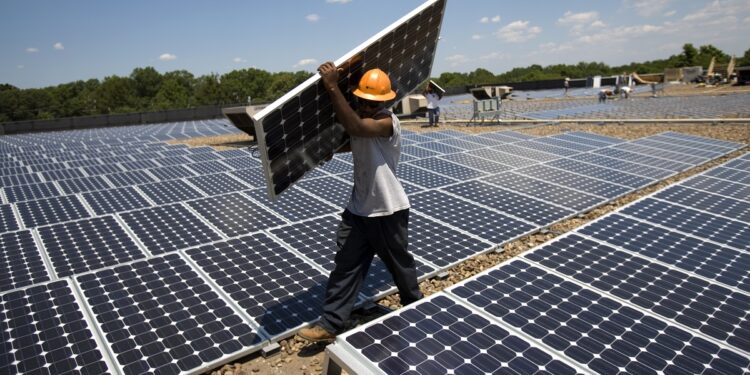The Department of Energy’s Inspector General is reviewing why the Joe Biden administration gave promising battery technology, developed by taxpayer dollars, to a Chinese company instead of making the batteries in the U.S.
China is now reportedly building one of the largest battery grids in the world using the technology, which could store huge amounts of solar energy without degrading over time or requiring lithium, mitigating a major environmental impact of current green technology that ends up in landfills.
In 2021, there was an “illicit Department of Energy (DOE) transfer of a fifteen million dollar, taxpayer-funded advanced battery technology to China,” Sens. John Barrasso (R-WY) and Joni Ernst (R-IA) wrote in a letter to the DOE’s internal watchdog.
The company that received the license “plainly stated on their official website that they planned to manufacture the batteries in China,” even though the license included “a requirement that the batteries be ‘substantially manufactured’ in the U.S. As these stipulations were continuously violated, DOE never raised any concern,” they wrote.
“We are concerned that this is an overt dereliction of duty by DOE, and that this case may be emblematic of a department that routinely and flippantly permits government-funded technology to be transferred to China,” the senators concluded.
In response, Inspector General Teri L. Donaldson replied this month that “we are conducting a thorough review of this matter.”
In August, NPR reported that U.S. government-funded scientists working at the Pacific Northwest National Laboratory had developed the “vanadium redox flow battery,” which could store enough energy to power a house and last for 30 years. The technology would make it easier to rely on solar power.
The U.S. government holds the patent on the technology, and in 2012, it licensed it to Gary Yang, one of the scientists who helped develop it, so that he could commercialize it. He launched a firm called UniEnergy Technology, but it ran into funding problems, NPR reported.
In 2017, Yang — an American citizen who was born in China — obtained a sublicense from the DOE to allow a Chinese firm to make the batteries. In 2021, he transferred the license outright to a Dutch company called Vanadis Power, which said it would make the batteries in China but eventually move production to Europe to comply with European rules.
America had those rules too, but seemed less strict about enforcing them. On July 7, 2021, UniEnergy emailed a government manager at the Pacific Northwest National Laboratory to request approval to transfer the license to Vanadis, and within 90 minutes, the government granted approval, even though Vanadis’ website said it would make the batteries in China.
Unnamed DOE officials told NPR they often rely on “good faith disclosures” — in other words, the honor system.
But an American company, Forever Energy, told NPR that they had been telling the DOE that the license was out of compliance, only to be shrugged off.
After questions from NPR, the DOE revoked the license, potentially freeing it up for an American company like Forever Energy.
But a Forever executive said now the U.S. is far behind, and that she doubts China will stop producing the technology simply because it no longer has the license.
Last month, Ernst said that taxpayer-funded tech breakthroughs routinely end up in the hands of China, and that a confidential Department of Defense report went so far as to say “China, not the U.S., is the ultimate beneficiary of DoD and other [U. S. Government] research investments.”
Related: $500,000 National Science Foundation Grant Produced Paper Saying Science Is Racist











